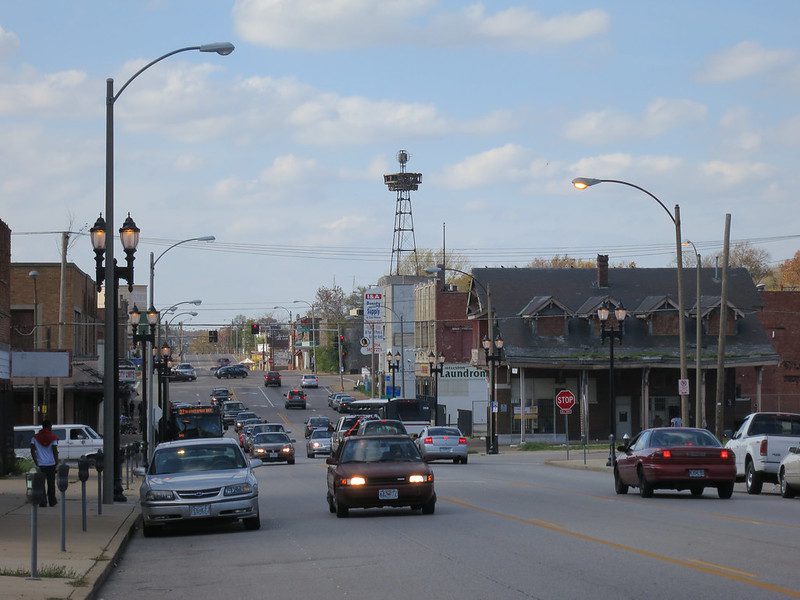Bill Clinton stepped up the other night and did what he needed to do if the Dems want to win this election: he threw down for Barack Obama and said unequivocally that Obama belongs in the White House.
He also detailed some of the disaster that has befallen our national economy.
With the policies of the Bush Administration, Clinton said, we’ve gone “from increasing working families’ incomes to nearly $7,500 a year to a decline of more than $2,000 a year; from almost 8 million Americans lifted out of poverty to more than 5.5 million driven into poverty; and millions more losing their health insurance.”
And Clinton mentioned the “war on unions.”
And howdy, it’s been war alright. The Bush administration, as we know, has gone hammer-and-tongs against the union movement, which, despite that, is now struggling to its feet the last few years after getting the snot pounded out of it for a few decades.
Unionization rates have dropped from a peak of 35 percent of the workforce way back in 1954 to some 12 percent now–and only 4 percent of those are private sector workers.
Some of that was labor’s own doing, abandoning organizing, frequently marginalizing people of color and being more cozy than strategic with management.
But that’s not to minimize the force of a corporate backlash against labor that saw many union-quashing policies put into play. Just one example: the National Labor Relations Board has lurched toward corporate appeasement and away from workers’ rights through a series of awful appointment; W’s iniquities are detailed here in this 2004 Village Voice article “Bush’s Other War”:
At the national labor relations board, the president’s appointees change the rules.
There’s a new labor movement now, and an Obama administration has the potential to be as good for it as Bush has been bad.
An interesting thing: there are now two expressions of the labor movement. One is the straight-up push to organize by industry and bring millions more workers into unions.
Another is the labor-community alliance organizing strategy that has moved forward in many towns since the big rupture in the national labor movement in 2005
You remember that schism — several big unions, led by the Service Employees International Union and UNITE HERE, the garment workers and hotel employees union, split from the AFL-CIO in a coalition called Change To Win.
That made a lot of people nervous. Seemed like the movement was enough on the ropes without a fracture.
But when I talked to local activists back then, they were less jumpy. There was plenty of ongoing local work that would continue uninterrupted by national schisms, they told me.
In June 2005, local and state labor councils formally organized into a national network. Madeline Janis, founder of the Los Angeles Alliance for a New Economy (LAANE), which is an anchor organization in the national group, called it “the real labor movement.”
She was referring to the on-the-ground work the labor organizations were doing with local community groups to pass living wage and other wage standard measures, demand local hiring at union rates for new developments and promote other policies to raise wage and work standards.
The national network is now the Partnership for Working Families. Local member groups link labor organizations with community groups — faith-based, civil rights, neighborhood organizations — to win good jobs and development standards in a given town, from Los Angeles to Denver to Pittsburgh and many in between.
LAANE, the Los Angeles anchor organization, won a recent victory that affects the working conditions of some 10,000 truckers at the Port of Los Angeles. As independent contractors, they made unlivable wages and could barely afford to maintain their diesel trucks — conspicuously adding to port pollution.
The LAANE-backed measure, achieved with support from Change To Win, requires trucking companies to act as employers and assume full responsibility for low-emission cargo vehicles.
Check out the Partnership For working Families Web site for the many successful campaigns the partners have won.
And there are other labor-community coalitions winning policies that create union jobs. The Apollo Alliance is another national organization that brings labor and community organizations together.
The LA Apollo Alliance has won an environmental audit of over 1,000 city buildings and the City Council is now moving on a plan to “green” them, starting with 200 inner city buildings first. Unions would train local young people for jobs in retrofitting air and water systems, and organizers anticipate the whole program could create some 2,000 green union jobs.
Tha‘’s the kind of labor-community organizing an Obama administration could uplift.
Long-time union organizer John Goldstein, these days the National Field Director for the Partnership for Working Families, sees enforcing and redrawing whole sets of federal regulation that seem arcane to us from the outside but have a real impact on the ground.
“There are really significant things a president could do,” he says. With Housing and Urban Development projects, Department of Transportation projects, for example, there are regulations that govern such things as wage standards, the percentages of monies used on a given project that could go to union apprenticeship programs or about who gets hired.
All those could be reviewed for better enforcement of existing programs and the creation of new ones.
And a movement is there to take advantage and raise wage and work standards.
“What’s exciting is that Obama understands the process of social change and has a demonstrated commitment to organizing at the grassroots level,” says labor organizing veteran Kent Wong, executive director of the UCLA Labor Center.
In the realm of straight-up union organizing, labor counts on an Obama administration to champion the Employee Free Choice Act, which, if passed, could dramatically enhance labor’s ability to organize, Wong says. For one thing, it would strengthen the penalties against employers who thwart employees’ efforts to organize.
And it would enable workers to approve unionization by signing cards rather than going through a lengthy ballot process that provides employers plenty of opportunity for intimidation.
“It could trigger a new wave of union organizing,” Wong says, and improve working conditions for millions.
Obama and his running mate Joe Biden are co-sponsors of the Employee Free Choice Act. Wong says labor is poised to mobilize in such battleground states as Florida, Nevada, New Mexico and Michigan.
(Even though John McCain chose Alaska Gov. Sarah Palin as his running mate Friday, pundits had been saying Michigan could be a win for a McCain-Romney ticket because Mitt Romney’s dad was governor there from 1963 to 1969. Forty years seems like a really long political half-life, but if they say so…)
Nothing can come close to what labor can deliver in terms of voter mobilization, Wong says.
And despite the split in the national labor movement, Wong says, “statewide and local level unions are working closely and effectively together.”




Comments